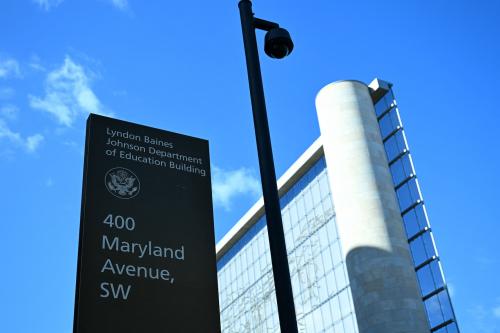Police and Legislators Clash in Nigerian Parliamentary Struggle
During a legislative session on Thursday regarding President Goodluck Jonathan’s request to extend the state of emergency in Nigeria’s northern states, police fired tear gas into the parliamentary building. The attack appeared to be directed toward Aminu Tambuwal, the speaker of the house, whose entourage, police claimed, were assaulting police officers and engaging in disorderly conduct in the parliament. Aminu Tambuwal argued that the police had blocked his entryway to the building and to his speakers’ chamber. Tambuwal is a controversial figure: Having defected to the All Progressive Congress (APC) opposition party last month, he technically is ineligible to serve as speaker. However, pending the resolution of a court case on the matter, he is allowed to continue serving in this role.
According to The Wall Street Journal, the outcome of the vote to extend the state of emergency in the northern states has particular political significance. If the state of emergency is extended, President Jonathan will be able to select military governors to the state, who will remain in place through the February 2015 elections. Since governors play a role in deciding the outcomes of elections, President Jonathan’s outlook will be much more favorable, especially considering that the opposition has been trying to leverage these states to vote against Jonathon’s re-election.
The president of Nigeria’s senate has suspended the session and closed the National Assembly until next Tuesday, November 25. Meanwhile, Boko Haram’s attacks in the northern states have been on the rise in the past few weeks, as the group staged another attack in Azaya Kura, Mafa District in Borno state that killed at least 45 people.
Soldiers’ Overdue Salaries Spur Protests in Cote d’Ivoire
On Tuesday, nearly 9,000 soldiers in Cote d’Ivoire protested over salary arrears and unpaid benefits amounting to $38 million by blocking roads in the capital Abidjan and major city of Bouake. The government owes the soldiers—including former rebels who have been integrated into the army since the end of civil war in 2011—wages and benefits according to a 2007 peace accord, but the soldiers have yet to receive them.
On Tuesday night, President Alassane Ouattara, who came to power after a disputed election and brief civil war in 2011, issued a statement via the interior minister that the soldiers would not be punished and would receive their pay. On Thursday, the soldiers agreed to return to their barracks after two days of negotiations with the government, which agreed to pay their overdue wages and benefits over the course of the next six months.
Cote d’Ivoire is the largest cocoa-producing country in the world and has become a major destination for investment in recent years. This incident, however, highlighted the tensions remain nearly three years after the last civil war, especially as Cote d’Ivoire attempts to re-establish a national army composed of former opposing factions.
Mombasa Mosque Raids Stir Tensions in Kenya
In recent years, police in Kenya have generally come to view mosques as centers where youths become radicalized and trained in the ways of jihadism. In further efforts to curb the spread of violent Islamist extremism, particularly the growing influence of al-Shabab in the region, Kenyan police conducted a series of raids on mosques in the coastal city of Mombasa throughout the week. On Monday, police collected weapons and literature linked to militant activities from two mosques. Hours later, youths with machetes led attacks through the city, killing at least three people. During Wednesday’s raids, one person was killed as police uncovered explosives at three mosques and arrested 109 people on the charge of undergoing militant training. Overall, police have arrested 376 people this week and will charge 158 of them with being members of al-Shabab. They released 91 individuals on lack of evidence. Some human rights activists and Muslim clerics have decried the raids for inflaming religious tensions and targeting the Muslim community, while others have defended the measures as necessary to the community’s safety.
The Brookings Institution is committed to quality, independence, and impact.
We are supported by a diverse array of funders. In line with our values and policies, each Brookings publication represents the sole views of its author(s).




Commentary
Africa in the News: Police Intervene in Nigerian Parliament, Soldiers Protest in Côte d’Ivoire, and Mosque Raids Ignite Tensions in Kenya
November 21, 2014